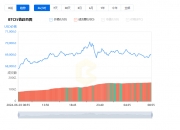
在这个信息化高速发展的时代,数字货币已经成为了一个不可忽视的话题。从比特币的诞生,到以太坊的智能合约,再到各种基于区块链技术的数字货币应用,数字货币正逐渐改变我们的金融生态。数字货币的崛起也带来了诸多法律与监管问题,许多人开始疑惑:数字货币到底违不违法?
Digital money has become an inescapable topic in this age of rapid informatization. From the birth of Bitcoin, to the intelligent contracts of Ether, to digital monetary applications based on block-chain technologies, digital money is gradually changing our financial ecology.
我们需要明确什么是数字货币。数字货币是一种依赖密码学技术和分布式账本(如区块链)实现的虚拟货币。与传统货币不同,数字货币不依赖于中央银行或金融机构发行和管理,而是通过计算机网络进行验证和记录。
Digital money is a virtual currency that relies on cryptography and distributed accounts (e.g. block chains). Unlike traditional currencies, digital money is not dependent on issuance and management by central banks or financial institutions, but is validated and recorded through computer networks.
比特币作为第一种数字货币,于2009年由一个化名中本聪的人或团队创造。比特币的成功激发了其他多种数字货币的出现,如以太坊、瑞波币等。随着时间的推移,数字货币逐渐从一种技术实验走向主流,吸引了大量投资者和企业的关注。
Bitcoin, as the first digital currency, was created in 2009 by someone or a team under a pseudonym. Bitcoin’s success inspired the emergence of a number of other digital currencies, such as Ethio, Riboco, etc. Over time, digital money has gradually moved from a technology experiment to mainstream, attracting attention from a large number of investors and businesses.
数字货币的法律地位在全球范围内存在巨大差异。在一些国家,数字货币被视为合法的金融工具,而在另一些国家,数字货币则被禁止或严格限制。
The legal status of digital currencies varies greatly globally. In some countries, digital currencies are considered legitimate financial instruments, while in others, digital currencies are banned or severely restricted.
美国是全球最大的数字货币市场之一。在美国,数字货币的监管框架相对复杂,涉及多个监管机构。美国证券交易委员会(SEC)将某些数字货币视为证券进行监管,而美国商品期货交易委员会(CFTC)则将比特币和其他数字货币视为商品。美国财政部的金融犯罪执法网络(FinCEN)要求数字货币交易所遵守反洗钱(AML)和了解你的客户(KYC)规定。
In the US, the regulatory framework for digital currencies is relatively complex, involving multiple regulators. The US Securities and Exchange Commission (SEC) regulates certain digital currencies as securities, while the US Commodity Futures and Exchange Commission (CFTC) treats Bitcoins and other digital currencies as commodities.
尽管存在监管,数字货币在美国是合法的。许多美国企业和投资者积极参与数字货币市场,推动了整个行业的发展。
Despite regulation, digital money is legal in the United States. Many United States firms and investors are actively involved in the digital money market, contributing to the development of the industry as a whole.
与美国不同,中国对数字货币采取了更加谨慎和严格的态度。2013年,中国人民银行发布公告,禁止金融机构和支付机构提供比特币相关服务。2017年,中国政府进一步加大监管力度,关闭了国内所有数字货币交易所,并禁止首次代币发行(ICO)活动。
In 2013, the People’s Bank of China issued an announcement prohibiting financial institutions and payment agencies from providing Bitcoin-related services. In 2017, the Chinese government further tightened its supervision, closed all digital currency exchanges in the country, and banned the first-time issue of the ICO.
尽管如此,中国并没有完全禁止数字货币的持有和私人交易。近年来,区块链技术在中国得到了广泛的认可和推广,数字人民币(DCEP)也正在试点和推广中。这表明中国政府对数字货币技术持有开放态度,但对其金融应用则采取严格监管措施。
In recent years, block-chain technology has been widely recognized and promoted in China, and the Digital renminbi (DCEP) is being piloted and promoted. This shows the Chinese government’s openness to digital money technology, but strict regulatory measures are being taken for its financial application.
在欧洲,各国对数字货币的态度和监管政策各不相同。欧盟整体上对数字货币持谨慎支持态度,努力在促进创新和保护消费者之间找到平衡点。欧洲央行(ECB)和欧洲证券与市场管理局(ESMA)都对数字货币进行了深入研究,并提出了相关的监管建议。
The European Central Bank (ECB) and the European Securities and Market Authority (ESMA) have both conducted in-depth studies of digital currencies and made relevant regulatory proposals.
例如,德国是欧洲数字货币监管较为完善的国家之一。德国金融监管机构(BaFin)将比特币视为金融工具,并要求数字货币服务提供商获得相关许可证。相比之下,英国的监管政策相对宽松,但也逐步加强了对数字货币的监管,特别是在反洗钱和打击恐怖主义融资方面。
For example, Germany is one of Europe’s more well-regulated digital money. The German financial regulator, BaFin, treats Bitcoin as a financial instrument and requires digital money service providers to obtain the relevant licences.
尽管数字货币在一些国家得到了合法地位,但其法律地位和监管框架仍然充满争议和挑战。以下是数字货币面临的主要法律问题:
Although digital currencies have been legalized in some countries, their legal status and regulatory framework remain controversial and challenging. The following are the main legal issues facing digital currencies:
由于数字货币是一种新兴事物,许多国家的法律和监管框架尚未完全成熟。这种不确定性给数字货币市场带来了诸多风险。投资者和企业在法律层面的不确定性可能会阻碍其发展。不同国家和地区之间的监管差异也使得数字货币的跨境交易面临复杂的法律挑战。
Since digital money is an emerging matter, the legal and regulatory framework in many countries is not yet fully mature. This uncertainty poses a number of risks to the digital money market.
数字货币的匿名性和去中心化特性使其成为洗钱和其他非法活动的潜在工具。虽然大多数数字货币交易是合法的,但其匿名交易特性使得监管机构难以追踪和控制非法活动。因此,全球各地的监管机构都在加强对数字货币交易的监控,要求交易所和相关服务提供商遵守反洗钱和了解你的客户规定。
The anonymity and decentralisation of digital money make it a potential tool for money-laundering and other illicit activities. While most digital money transactions are legal, their anonymity makes it difficult for regulators to track and control illicit activities.
由于数字货币市场的波动性和技术复杂性,消费者保护成为一个重要问题。数字货币的价格剧烈波动可能导致投资者遭受重大损失。一些不法分子利用数字货币进行诈骗和欺诈活动,侵害消费者权益。为此,许多国家开始制定相关法律法规,以保护消费者免受损失和欺诈。
Because of the volatility and technical complexity of digital currency markets, consumer protection is an important issue. The price volatility of digital currencies can lead to significant losses for investors.
尽管数字货币在法律和监管层面面临诸多挑战,但其潜在的技术和经济价值使得各国政府和监管机构不得不正视其存在,并探索合理的监管路径。
Despite the many challenges faced by digital money at the legal and regulatory levels, its potential technical and economic value has forced Governments and regulators to confront its existence and explore reasonable regulatory paths.
为了促进数字货币的健康发展,各国需要制定明确的法律框架,消除监管不确定性。这包括明确数字货币的法律地位,制定相关的税收政策,以及对数字货币交易所和服务提供商进行有效监管。
In order to promote the healthy development of digital currencies, countries need to have a clear legal framework to remove regulatory uncertainties. This includes clarifying the legal status of digital currencies, developing relevant tax policies, and effectively regulating digital currency exchanges and service providers.
数字货币具有全球性,其交易和使用往往跨越国界。因此,加强国际合作,制定统一的监管标准显得尤为重要。通过国际合作,各国可以共同打击利用数字货币进行的洗钱和非法活动,促进数字货币市场的稳定和安全。
It is therefore particularly important to strengthen international cooperation and establish uniform regulatory standards. Through international cooperation, countries can work together to combat money-laundering and illegal activities using digital money and to promote stability and security in digital money markets.
区块链技术是数字货币的基础,具有广泛的应用前景。各国政府应鼓励技术创新,支持区块链技术的发展,并探索其在金融、物流、医疗等领域的应用。政府也应加强对数字货币技术的研究和开发,确保在全球数字经济中占据领先地位。
Governments should encourage technological innovation, support the development of block chain technology, and explore its applications in areas such as finance, logistics, and health. Governments should also strengthen research and development on digital currency technology to ensure a leading role in the global digital economy.
数字货币作为一种新兴的金融工具,其法律地位和监管框架仍在不断演变中。尽管面临诸多法律和监管挑战,但数字货币的技术和经济潜力使得其在未来具有广阔的发展前景。通过制定明确的法律框架、加强国际合作和推动技术创新,各国有望在促进数字货币健康发展的保护消费者权益,维护金融市场的稳定和安全。
Despite many legal and regulatory challenges, the technological and economic potential of digital money offers broad prospects for development in the future. By developing a clear legal framework, strengthening international cooperation and promoting technological innovation, countries are expected to protect consumers’ rights and interests and preserve the stability and security of financial markets by promoting the healthy development of digital money.
在这个充满机遇与挑战的数字时代,了解数字货币的法律地位和监管动态,不仅有助于我们把握投资机会,也能帮助我们更好地应对未来的金融变革。数字货币是合法还是非法,不仅取决于法律规定,更关乎我们对未来金融世界的认知和适应能力。
In this digital age of opportunities and challenges, understanding the legal status and regulatory dynamics of digital money not only helps us to take advantage of investment opportunities, but also helps us to better cope with future financial changes. Whether digital money is legal or illegal, depends not only on legal provisions, but also on our ability to understand and adapt to the future financial world.
注册有任何问题请添加 微信:MVIP619 拉你进入群

打开微信扫一扫
添加客服
进入交流群


















发表评论